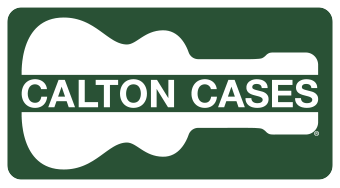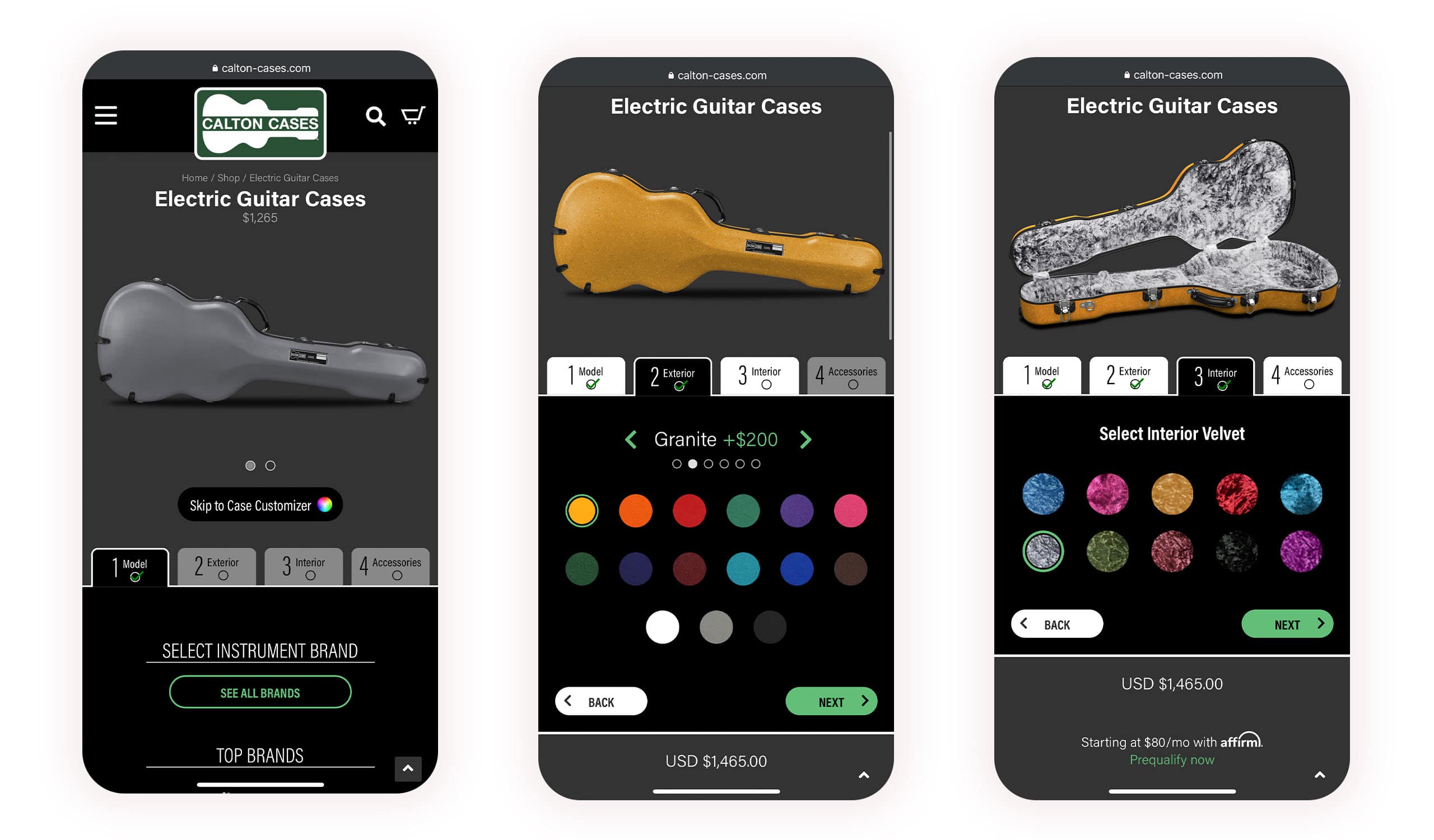
Calton Cases
Transforming Calton Cases into an E-Commerce Success Story
Client Overview
Calton Cases is a well-established manufacturer of custom, high-quality instrument protection cases. Since the 1960s, the company has been recognized for its best-in-class custom guitar and instrument cases. Before working with us, Calton Cases operated exclusively through authorized dealers and a quote-based custom-order system. However, challenges brought on by the COVID-19 pandemic forced the company to rethink its sales strategy and transition into direct-to-consumer e-commerce.
Initial Challenges
- Technical Issues with the Existing Website:
- At first glance, the website appeared 90% complete, but a deeper inspection revealed core foundational issues. The lookup system for custom case configurations was inefficient, causing slow load times of up to 10 seconds per step and a total of 90 seconds for a single case selection process.
- The website's infrastructure was riddled with bugs and was deemed not launch-able.
- Outdated Business Model:
- Calton Cases relied on its network of authorized dealers for sales. When COVID-19 caused physical stores to shut down, the company experienced a sudden halt in revenue.
- Leadership was initially resistant to direct-to-consumer e-commerce, preferring to maintain the dealer model. However, the necessity to survive led them to pivot.
- Complex Product Customization Process:
- The company's cases offered over a million possible combinations, including custom colors, finishes, and other personalization options. While this showcased their craftsmanship, it often led to "analysis paralysis" for customers, reducing conversion rates.
- Fragmented Internal Processes:
- Manufacturing, fulfillment, and sales departments had manual workflows that lacked integration. This made scaling the business difficult.
Approach
Phase 1: Discovery and Roadmap Development
- Conducted a thorough discovery process to uncover technical, design, and UX challenges.
- Developed a roadmap to rebuild the website with a focus on mobile-first design, seamless user experience, and technical reliability.
- Collaborated with Calton's internal graphic design team to ensure the designs were suitable for digital platforms and adhered to UX best practices.
Phase 2: MVP E-Commerce Launch
- Within 14 days, we developed a minimum viable product (MVP) to enable customers to purchase cases online. This included:
- A basic form with dropdown menus for customization.
- A simplified order submission and payment system.
- This MVP allowed Calton to resume sales during the pandemic and generate immediate revenue.
Phase 3: Full E-Commerce Transformation
- Built a custom WooCommerce solution on WordPress, including a fully customized theme and plugin stack for their product customizer.
- Designed an interactive case customizer tool that allowed users to select options and visualize their case in real time. Over a million possible combinations were made available, yet the user interface was simplified to prevent decision fatigue.
- Introduced an "inspiration gallery" showcasing popular configurations, along with ready-to-ship cases for faster delivery.

Phase 4: Streamlined Operations
- Automated internal workflows by developing a custom SKU generation system. This allowed the manufacturing team to easily track and produce cases based on specific configurations.
- Implemented an abandoned cart recovery system. Using a custom-built image compression engine, the system generated preview images of partially configured cases, which were emailed to customers to encourage conversions.
Phase 5: Marketing and SEO
- Partnered with Calton’s marketing team to optimize the site for SEO, ensuring organic growth.
- Conducted user research and usability testing to refine the customer journey.
Launched limited ad campaigns to test consumer interest and refine marketing strategies.
Results
- Revenue Growth:
- The e-commerce platform generated over $1 million in revenue annually in 2022 and 2023, accounting for 60% of the company’s sales. This marked a significant shift from a 100% dealer-based model to a blended dealer-direct approach.
- Traffic Growth:
- From 2021 to 2022, active users increased by 300%.
- Organic traffic alone grew by 41% from 2022 to 2023.
- Improved User Experience:
- The new interactive customizer and "inspiration gallery" reduced decision fatigue and increased conversions.
- Customers praised the ability to customize and purchase cases directly from the company, a service that had previously been unavailable.
- Operational Efficiency:
- Automated workflows significantly reduced manual labor for the manufacturing team.
The streamlined ordering process decreased lead times and improved customer satisfaction.
- Automated workflows significantly reduced manual labor for the manufacturing team.
Key Challenges and Solutions
- Analysis Paralysis:
- Challenge: Customers were overwhelmed by the sheer number of customization options.
- Solution: Introduced pre-designed “popular options” and ready-to-ship cases to guide customer decisions.
- Technical Limitations:
- Challenge: Legacy systems slowed down the customization process and created inefficiencies.
- Solution: Rebuilt the website from scratch, leveraging modern front-end (HTML, CSS, JavaScript) and back-end (PHP, WooCommerce) technologies. Planned future upgrades with React for performance improvements.
- Resistance to Change:
- Challenge: Leadership was initially hesitant to embrace direct-to-consumer sales.
- Solution: Demonstrated the necessity of e-commerce during the pandemic and designed an MVP that quickly proved its value.
Timeline
- Engagement Period: January 2020 - December 2023
- MVP Launch: 14 days after the project kickoff
- Full E-Commerce Platform Launch: Within 6 months
Key Takeways
- Adaptability is crucial in times of crisis; Calton Cases pivoted from a traditional sales model to e-commerce, ensuring business continuity.
- A customer-centric approach, combined with technical excellence, can drive significant revenue growth and brand loyalty.
- Collaboration across departments (design, manufacturing, fulfillment, marketing) is essential for implementing scalable solutions.
Conclusion
Our collaboration with Calton Cases transformed their business from a dealer-only model to a thriving e-commerce platform. By overcoming technical, operational, and strategic challenges, we helped them not only survive the pandemic but also position themselves for long-term growth. The project showcased our ability to deliver rapid, impactful solutions while aligning with the client’s vision and brand.
